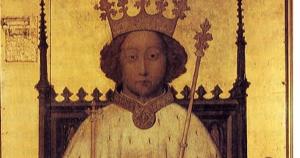 Times were bad, but rebellion was not the answer.
Times were bad, but rebellion was not the answer.
Truly gruesome people often rise to the top in a rebellion: Henry IV if you are blessed, Napoleon on average, Stalin if cursed to live at the beginning of the end.
At the start of the twenty-first century, Americans have outlived the World War II accommodation with the world. We are deciding what will be next and this can be glorious, usually a muddle, or very terrible if we choose badly. Things do not seem promising just now.
Shakespeare wrote in such a time (the end of the Tudors and the first of the Stuarts) in Richard II. His Richard was a party man, the licentious sort, not the principled kind. He is resisted, then opposed, and finally removed. Nothing becomes Richard II so much as his departing from power. Once out of power he gets the best speeches and Henry, the man who replaces him as King, is made less with power, not greater.
Henry’s father, John of Gaunt, is the best man left in England, but his virtue is out of fashion and so he dies. Richard II, like everyone given to personal pleasure, claims absolute power, but Gaunt knows the King cannot give him even a moment of life:
I thank my liege that in regard of me He shortens four years of my son’s exile. But little vantage shall I reap thereby, For ere the six years that he hath to spend Can change their moons and bring their times about, My oil-dried lamp and time-bewasted light Shall be extinct with age and endless night. My inch of taper will be burnt and done, And blindfold death not let me see my son.*
John of Gaunt has had political power, used it wisely if imperfectly, and so knew the limits to power. Power can never bring pleasure disconnected to virtue.
Before leaving the stage, Shakespeare gives him a brilliant speech:
Methinks I am a prophet new-inspired, And thus, expiring, do foretell of him. His rash, fierce blaze of riot cannot last, For violent fires soon burn out themselves. Small showers last long, but sudden storms are short. He tires betimes that spurs too fast betimes. With eager feeding food doth choke the feeder. Light vanity, insatiate cormorant, Consuming means, soon preys upon itself. This royal throne of kings, this sceptred isle, This earth of majesty, this seat of Mars, This other Eden, demi-paradise, This fortress built by nature for herself Against infection and the hand of war, This happy breed of men, this little world, This precious stone set in the silver sea, Which serves it in the office of a wall, Or as a moat defensive to a house Against the envy of less happier lands; This blessèd plot, this earth, this realm, this England, This nurse, this teeming womb of royal kings, Feared by their breed and famous by their birth, Renowned for their deeds as far from home For Christian service and true chivalry As is the sepulchre, in stubborn Jewry, Of the world’s ransom, blessed Mary’s son; This land of such dear souls, this dear dear land, Dear for her reputation through the world, Is now leased out—I die pronouncing it—Like to a tenement or pelting farm. England, bound in with the triumphant sea, Whose rocky shore beats back the envious siege Of wat’ry Neptune, is now bound in with shame, With inky blots and rotten parchment bonds. That England that was wont to conquer others Hath made a shameful conquest of itself. Ah, would the scandal vanish with my life, How happy then were my ensuing death!**
John of Gaunt loves England, not power or a king. He loves the people, the heritage, the place. He is a patriot, not a jingoist. As a Christian, he loves his family, but also his neighbors! Still, John of Gaunt grieves the pain in his nation, the failures of the decadent leaders, and that he must leave. Those who love pain end up consuming their followers, their friends, nothing can satisfy them.
Note that the trivial who memorize this speech too often leave off the beginning and the end because this prophet, new-inspired, condemns our vices in this age. We use old John of Gaunt as a nostalgic travel commercial to lure world travelers to go to little England. Yet John is making a bigger claim: decadence burns itself out and dies. We cannot live for personal peace and affluence and thrive and this is terrible because our very homes will be consumed. We are not fit for the realm we rule.
This prophet, old John Gaunt, cannot believe such a land would love pleasure and power over her ideals. The powerful conquer themselves and so nothing is left of loved home. We burn out, bad enough, but we put something lovely, home, at risk.
Never trust a man who cannot love his own home. The love of home can be twisted to prejudice against other lands, just as love of one woman could lead a man to think her the only good woman. Yet the other mistake is as bad, a man who loved no family, no people, because he lacked a home. He is Odysseus with no place to go. God help us if we are now so rootless that we have no home.
John of Gaunt speaks to Englishmen through centuries, because he loves proportionally a people and a place. Americans can learn from old John Gaunt: patriotism without prejudice, politics without party. Richard, for all his flowery speeches at the end, is about Richard and not England. He will sell the nation to “win:”
We are enforced to farm our royal realm, The revenue whereof shall furnish us For our affairs in hand. If that come short, Our substitutes at home shall have blank charters, Whereto, when they shall know what men are rich, They shall subscribe them for large sums of gold, And send them after to supply our wants; For we will make for Ireland presently.***
God save us from kings who would win, sell us to foreign powers to retain power. God save America.
———————————————-
*Shakespeare, Richard II 1.3
**Shakespeare, Richard II 2.1
***Shakespeare, Richard II 1.5












